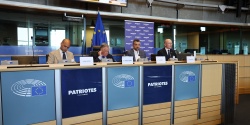Published: 13.06.2025

Wednesday's presentation in Brussels of the European Union reform plan developed by Poland’s Ordo Iuris Institute and Hungary’s Mathias Corvinus Collegium garnered significant interest. Nearly a hundred MEPs and their staff from many countries came to the presentation of this proposal. The main organizer of the event was the Patriots for Europe group, but it was an open invitation and there were also representatives of other groups sitting in the European Parliament.
The European Conservative ran a piece on this event.
The “Great Reset” document circulating through European institutions
The document titled “The Great Reset: Restoring the Sovereignty of Member States in the European Union” was distributed this week to many MEPs, Brussels officials, and CJEU judges.
So far, the proposals of Ordo Iuris and MCC have already been published in five languages and presented in Warsaw, Washington, Budapest, and Madrid. The proposals were supported by the Hungarian government and the Spanish Vox party, as well as some Law and Justice as well as Confederation leaders in Poland. The next presentation is planned in Paris and is set to be attended by leading representatives of the French National Rally party. The Ordo Iuris Institute is also in discussions with the Italian think tank Centro Machiavelli, which is closely associated with Premier Giorgia Meloni's party, about further work on the project and its presentation in the near future in Rome.
The document “The Great Reset” actually represents the first stage in preparing a detailed proposal for amending European treaties in collaboration with a larger number of think tanks and organizations from across the European Union. The initiative to prepare an alternative treaty reform project originated in September last year at an international conference held in Warsaw by the Ordo Iuris Institute and the American think tank Heritage Foundation, titled “ At the Threshold of the State of Europe: Economy, Defense, Ideology, and Protection of Sovereignty in a Transatlantic Perspective.”
Left-wing media warn against the sovereigntist reform plan
Regarding the preliminary assumptions for the EU reform prepared by the Ordo Iuris Institute and MCC, the Vice-President of the Vox party, José Buxadé, said during its presentation in Madrid: “We now have a program.” Such support from the Spanish conservative party alarmed the largest Spanish leftist newspaper, El País, which published a long article on June 6, titled “The Great Reset: A Detailed Plan for Dismantling the EU, Exciting the Vox Party.”
Earlier, similar concerns in left-liberal circles were provoked by this project in Poland, as evidenced by the nervous reactions in the media of Foreign Affairs Minister Radosław Sikorski. Alarming texts have appeared in leftist media in Poland, Hungary, and Germany, where, among others, the newspaper Tagesspiegel titled a piece published on April 24: “Project 2025 Trumpa is a model for them to follow: How right-wing think tanks centered around Viktor Orbán aim to destroy the EU.” The subtitle further read: “Right-wing extremists from Poland and Hungary want to weaken European institutions. They receive support from the USA. The European Union must take these plans seriously.”
By the end of March, a left-wing think tank from France, Le Grand Continent, translated the entire text of “The Great Reset” into French and Spanish and published it under the alarming title: “Regime Change: Full Text of the Report Supported by Pro-Trump Circles to Overthrow the European Union.” As we can read in the introduction: “In complete silence, two far-right European foundations presented Washington with a radical plan. It draws from the source of the American counter-revolution—the famous Project 2025—to turn Europe upside down, overthrowing the Union. Now supported by the most influential think tanks in Trump's galaxy, this 40-page report should be read carefully. The European 'Great Reset' project is conceived as a coherent program of public policies aimed at a comprehensive transformation of the continent's legal, economic, and social spheres. After a phase of populism, it reflects a new era characterized by a deep rift in the heart of Europe.
The European Union's sovereignty reform project has sparked interest not only within the ranks of the Spanish party Vox but also in Hungary's ruling party, Fidesz, as clearly reflected in a speech by Balázs Orbán, Political Director to the Hungarian Prime Minister (no relation), during the presentation of the 'Great Reset' in Budapest. We also hear voices in the French National Rally led by Marine Le Pen expressing great interest in this project. Large Italian newspapers also wrote about him.
Two reform scenarios: treaty changes or new cooperation
The authors of the EU reform project do not actually aim to destroy the EU, but rather the opposite: to save the EU from self-destruction, and at the same time to save democracy from attempts to centralize the Union and create a European superstate. This is a vision of Europes a community of free, democratic nations cooperating with one another—contrasted with the “Empire of Europe” vision promoted by a large part of the Brussels elite.
The authors of the publication “The Great Reset” propose a return to the foundations upon which the European Union was originally based, including principles such as national sovereignty, representative democracy, and subsidiarity. The document presents two alternative scenarios for EU reform. The first entails changing EU treaties by implementing 23 proposals aimed at redefining and adjusting executive, legislative, and judicial competencies, while simultaneously strengthening the role of nation-states, their constitutions, and governments. If such a reform proves too difficult to implement due to time, costs, or resistance, the second scenario envisages the dissolution of the EU and the establishment of cooperation among European countries on a voluntary basis, in accordance with the principles of the proposed changes.
The joint project of conservative circles as a response to the Verhofstadt, Scholz, and Macron initiative
The publication is a response to the Treaty reform project adopted by the European Parliament in 2023, which would significantly reduce the sovereignty of member states. For this reason, the Ordo Iuris Institute has submitted its proposals to EU and national officials, as well as to conservative and sovereignty-oriented organizations and parties, as a potential position in the negotiations over the future shape of the European Union. This document has already been published in five languages (Polish, Hungarian, English, French, and Spanish).
Discussing the dissolution of the European Parliament in its current form—right in the lion's den—and being applauded for it was an extraordinary experience," joked attorney Jerzy Kwaśniewski, president of the Ordo Iuris Institute, following Wednesday's presentation of the 'Great Reset' in Brussels.
The “Great Reset: Restoring Member State Sovereignty in the European Union” project has the potential to become a unifying initiative for conservative circles across Europe, as evidenced by discussions with representatives of right-wing parties from various countries at international events—such as the recent "Freedom in a Changing World" conference in Brussels, organized by the ECR Group Foundation, and the CPAC Hungary conference in Budapest. And if it becomes a joint project, discussions about the reform of the European Union will no longer be held within the constraints imposed by the ardent eurofederalist Guy Verhofstadt, the main author of the centralist reform project adopted in November 2023 with the support of Berlin and Paris, but rather within a much broader framework—one that considers the possibility of changing the direction set by the left-liberal elites currently dominating in Brussels.
This was the objective set by the think tanks gathered at the September conference in Warsaw, and this goal appears to be increasingly achievable.

• Amendments to the directive on the rights of victims of crime are currently under consideration in the European Parliament.

• The pressure on the European Union’s southern borders has continued unabated since the great migration crisis of 2015.

23.05.2025
We are currently engaging with think tanks and political parties across the continent to collaboratively develop a detailed counter-proposal to the centralist, anti-national, and anti-democratic vision of the European Union promoted by the European Parliament and President Macron.

15.05.2025
• The European Democracy Shield, an instrument designed to guarantee the EU’s resilience against hybrid attacks and external interference, is currently being developed within European Union institutions.